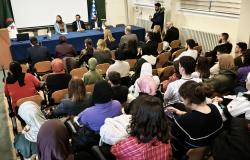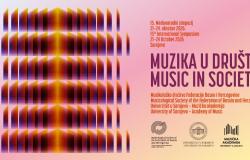The University of Sarajevo commemorated 27 January - Holocaust Remembrance Day

The Institute for Research of Crimes against Humanity and International Law, University of Sarajevo, in cooperation with the Jewish Community in Bosnia and Herzegovina, organized the commemoration of 27 January - Holocaust Remembrance Day, in accordance with epidemiological measures introduced due to COVID-19.
Within commemorating 27 January - Holocaust Remembrance Day, the Institute for Research of Crimes against Humanity and International Law, University of Sarajevo organizes and participates in a series of activities to honor Holocaust victims, as well as further study of crimes committed in Bosnia and Herzegovina during the Holocaust.
On that occasion, 26 January 2021, in the University of Sarajevo Rectorate, the exhibition “Concentration camps, places of suffering of the Jews of Bosnia and Herzegovina” was opened by Dr. Eli Tauber.
Dr. Tauber stated that the posters presents camps in BH, camp buildings, deportation of Jews, laws that disenfranchise Jews, and many other horrors.
“The posters show that the Jews, having lost their civil status, were taken to the camps. They were put in cattle wagons, they died on the way to the camp, they were killed when they got out of the wagons, and a part of them was never even registered to have ever arrived in the camps,” Tauber pointed out. The basic idea of the exhibition, he added, is to show the moment of the Holocaust and try to bring it through certain parts to the moment when the final solution of the “Jewish question” was reached, and that is the placement of Jews in camps, where it all ended.
“A small number of people survived the concentration camps, they were people of exceptional physical fitness or they were lucky not ending up in gas chambers,” he pointed out.
He also stressed that everything was extremely well arranged and that nothing was left as an opportunity for unforeseen things to happen. Speaking about Auschwitz, he pointed out that everything in that camp was planned in advance and that the camps were set up in a way that would enable the most efficient execution.
“The number of people killed in Auschwitz goes beyond discussion, but it is important to know that it is the largest 'death factory' and a very well-developed system of destruction with the Cyclone-B gas injected into the drains. People were killed very perfidiously, they were taken for a bath and then killed,” he emphasized.
As part of the commemoration of the Holocaust Remembrance Day, a round table was held on the topic “Suffering of the Jews of Bosnia and Herzegovina in the Holocaust.”
The meeting was greeted by the University of Sarajevo Vice-Rector, Prof. Dr. Tamara Karača Beljak, emphasizing that commemoration of such dates is extremely important, because fascism as an ideology has never been completely defeated.
Prof. Dr. Rasim Muratović, director of the Institute for Research on Crimes against Humanity and International Law, University of Sarajevo, recalled that in 2005 the UN General Assembly passed a resolution obliging all democracies to commemorate 27 January as Holocaust Remembrance Day. He reminded that it was the day when Soviet troops entered in one of the largest concentration camps in the world – Auschwitz and liberated it where millions of Jews died. He recalled that millions of people were killed because they did not agree with the fascist regime.
He reminded how many scientists dealt with this topic and came to the conclusion that it was an authoritarian system and the execution of the order of an authoritarian leader.
Prof. Dr. Rasim Muratović, director of the Institute for Research of Crimes against Humanity and International Law, University of Sarajevo, spoke at a round table on Understanding the Concept of Evil in the Work of the Holocaust in Bosnia And Herzegovina, by Elijah Tauber.
On the topic “Legal framework for committing crimes against Jews in Bosnia and Herzegovina”, spoke Dr. Sabina Galijatović, Research Associate, Institute for Research of Crimes against Humanity and International Law, University of Sarajevo.
Mr. Sc. Lamija Muftić, expert associate, Institute for Research of Crimes against Humanity and International Law, University of Sarajevo, had a presentation on the topic: "Deportation of Jews of Bosnia and Herzegovina.”
Dr. Eli Tauber, Cultural Adviser at the Jewish Community of Bosnia and Herzegovina, spoke on the topic “Camps and Places of Suffering of Bosnian Jews.”
Delegation of the Institute for Research of Crimes against Humanity and International Law, University of Sarajevo headed by the Director, Prof. Dr. Rasim Muratović, will visit the former Kruščica concentration camp near Vitez and lay flowers at the memorial to the victims of fascist terror on 27 January 2021 at 12:00.
























